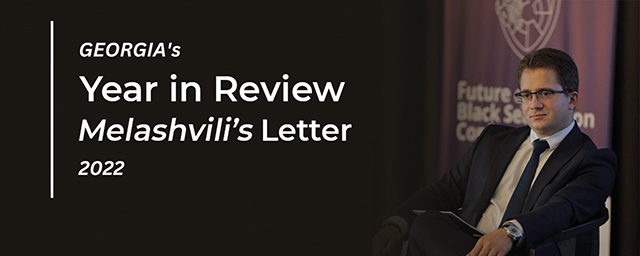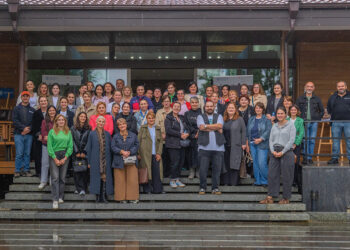Blog by George Melashvili, President, Europe-Georgia Institute.
If I had to choose a word to end the outgoing year of 2022 and welcome the New Year, there would be only one single word on my mind: Ukraine. Following tectonic changes in world politics caused by Russia’s unprovoked and unjustified invasion of Ukraine, the world – as we knew it – has changed.
Drastic, personal, and even childish quarrels between the Georgian government and Ukraine was an unfortunate contrast to the will of the Georgian people, demonstrating our support and solidarity to Ukraine on every occasion possible. There are no words to properly describe the contribution of Georgian volunteers fighting and dying together with Ukrainian warriors defending the freedom and liberty of Ukraine, and thus defending Georgia’s freedom as well.
A far-reaching contrast between the Government and the will of the people, together with the fragmentation of Georgia’s political elites, is probably the best description of this outgoing year in Georgia. The sacrifice of Ukraine has changed the geopolitical situation in the region and opened a window of opportunity both for Georgia and Moldova; but where the Government of Moldova has the political will to implement EU’s requests of reforms, the Georgian Government, in its pursuit of power, is not willing to compromise or properly implement the EU’s reform agenda.
Reluctance to implement reforms that decrease absolute power is not something new and is very similar to the fiasco with Charles Michel’s Agreement, but this time the price is much higher. The actions of the Georgian government have already cost Georgia a chance to receive EU Candidacy status together with Ukraine and Moldova, and by supporting ridiculous conspiracy theories and empowering anti-western forces in Georgia, the Government risks unleashing powers beyond its comprehension.
However, this strategy seems to be backfiring for the Government itself. Decreasing support among their own base, not willing to sacrifice Georgia’s European future even for the sake of the political party, is a clear trend visible in the polls. This situation has resulted in the creation of a new, anti-western conspiracy movement aiming to portray the ruling party as a reasonable political force in contrast to the anti-western conspiracy theorists.
This strategy is also not something new for Georgia; since 2012, different political groups were utilized to capitalize on the votes of the anti-western electorate. These political projects were abandoned and forgotten as soon as their political resources were drained; the dramatic (and in some sense tragic) history of the Georgian March, Alliance of Patriots, Conservative Movement and other ghostly political projects is a good illustration of the vicious cycle of disposable anti-western political projects in Georgian politics, and their predestined defeat.
The appointment of the new Public Defender of Georgia was marred by controversy and served as an example of the ruling party’s unwillingness to relinquish any of their power, similar to their previous refusal to allow the International Society for Fair Elections and Democracy (ISFED) to participate in the electoral system reform group. ISFED’s case is also an example of a long-lasting attempt to discredit civil society and portray them as “enemies of the state”, and introduce new legislation copy-pasted from the Russian “Foreign Agents Law”. This legislation – if introduced – will be an unfortunate attempt to control civil society and will further deteriorate relations between Georgia and its western allies.
The cases of Mikheil Saakashvili and Nika Gvaramia continue to attract attention. The US Embassy has stated that Gvaramia’s case raises concerns about Georgia’s commitment to the rule of law and the importance of an independent, impartial judiciary in the country. Saakashvili’s case, which has political undertones, has become even more complex due to the decline in health of Georgia’s third President and the refusal of the GD party to allow him to receive medical treatment outside of Georgia.
However, the will of the people remains unchanged – three-quarters of Georgians see themselves as pro-Western and only a tiny proportion of the population is pro-Russian; a reality that the Government was forced to acknowledge. Following one of the biggest protests in Georgian history on February 25, Prime Minister Irakli Garibashvili formally applied for EU membership, resulting in the recognition of Georgia’s European perspective.
The Zeitenwende, and Olaf Scholz’s speech mentioning “we are people of Europe, our voice must resound throughout Europe, from Lisbon to Tbilisi, and beyond” was also an important demonstration of the changing times and an important addition to Ursula von der Leyen’s message to the people of the Western Balkans, of Ukraine, Moldova and Georgia “You are part of our family, your future is in our Union, and our Union is not complete without you!”
Two tragedies occurred in Georgia this year, causing grief among the population. The first tragedy was the crash of a Georgian Border Police helicopter, Mi-8, near the mountain resort of Gudauri, which resulted in the deaths of four crew members, two rescuers, and two paramedics. The rescue team had been attempting to recover a pilot and his passenger who were involved in a paraglider crash earlier in the same incident. The second tragedy occurred in Tbilisi, when three teenagers were electrocuted after attempting to retrieve a ball that had fallen into a fountain. One of the teenagers, a 13-year-old girl, died after being taken to the hospital, while her two friends were treated for their injuries and released from the clinic.
The situation in Georgia’s occupied territories remains complex. Irakli Bebua, an ethnic Georgian resident of the occupied Gali district, was arbitrarily arrested by Russian-backed Abkhaz authorities on September 30th for burning an Abkhaz decorative banner. In 2020, he was sentenced to 9 years in prison and remains imprisoned, with his health rapidly deteriorating. Kristine Takalandze, a 24-year-old, has been accused of spying by the security service of Russian-occupied Abkhazia and is also being detained. In an attempt to increase pressure on Georgia, the dictator of Belarus, Aleksandr Lukashenko, visited Abkhazia, causing outrage in Georgian society.
The United Transitional Cabinet of Belarus, affiliated with Svetlana Tsikhanouskaya, swiftly declared its support for the territorial integrity and sovereignty of Georgia. The situation in the occupied Tskhinvali region remains complicated as well, with continued creeping borderization and occasional kidnappings of Georgian citizens.
Two significant developments regarding Georgia’s occupied territories were the European Parliament’s vote to non-recognize Russian travel documents issued in occupied regions of Georgia and Ukraine, and the decision of the International Criminal Court’s prosecutor, Karim A.A. Khan KC, to conclude the investigation phase in the Situation in Georgia, issuing warrants of arrest for representatives of the Russian occupational regime.
The Agreement on the Black Sea Electricity Cable was an important achievement of 2022 as well. The agreement was signed on December 17 by Georgian Prime Minister Irakli Garibashvili, Azerbaijani President Ilham Aliyev, Hungarian Prime Minister Viktor Orban, and Romanian Prime Minister România Nicolae Ciuca. This achievement will bring the European Union closer to the South Caucasus region, and it will facilitate the clean energy transition for both the EU and the Caucasus as well as contributing to the energy security of the EU and Georgia.
Despite all the challenges, 2022 will be forever remembered for generations to come as a cornerstone of Georgia’s European integration, just like 1999 – when Zurab Zhvania delivered his speech “I am Georgian, and therefore I am European”. The recognition of Georgia’s European Perspective is a tremendous achievement of the Georgian people, and generations of politicians and diplomats, finally ensuring that Georgia is welcomed back into the European family and accepting that the future of the Associated Trio countries and their citizens lies within the European Union.
If there is anything that not only I, but all of us should wish for at Christmas and the New Year, it is the victory of Ukraine, an end to this bloodshed, and proper justice for the warmongers who started this war, in memory of their victims. There is a saying by the great Shota Rustavelli that goes, “Having defeated evil, good will prevail in this world indefinitely” – and this is exactly what should happen.. To end this letter in a traditional Georgian manner, I propose a toast – to the victory of Ukraine and to the European future of Georgia, Ukraine and Moldova!














